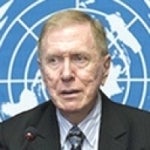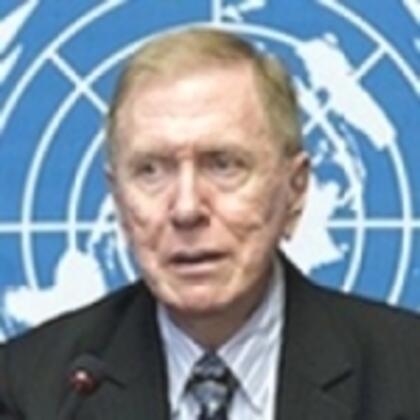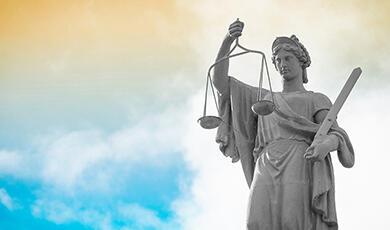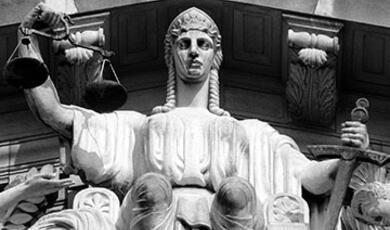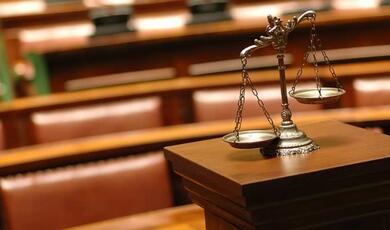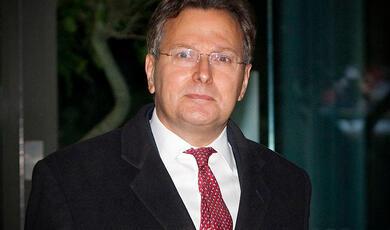North Korea's Unspeakable Crimes Against Humanity: Proven
Share
- Details
- Transcript
- Audio
- Downloads
- Extra Reading
Michael Kirby was one of Australia's top lawyers and judges. Now he heads a commission examining evidence of brutal Human Rights Abuse in the pariah state North Korea. In this brief talk he outlines the methodology and experience of the panel putting together the report.
The full report can be downloaded from the Commissioner for Human Rights Website.
Download Transcript
21 March 2014
North Korea's Unspeakable Crimes Against Humanity: Proven
Justice Michael Kirby
Introduction by Sir Geoffrey Nice QC:
In reverse order, but Sonja will come up I hope now, Sonja Biserko is the Commissioner from Serbia, who established or was at the establishment of the Helsinki Committee in Serbia, and throughout her life since then has dealt with the appalling things that human beings do to each other, but has dealt with it fearless as to whom she tells the truth. So, Sonja, please come and be at the table so that, when there is the discussion, people can speak to you.
Justice Kirby has an immensely long record of varied human rights activities as a judge and in associated areas, but spent many years on the bench in Australia, reaching the highest level of their court system, before, amongst other things, coming to bring his forensic skills and understanding of justice to the plights of humans represented so graphically, and in a sense, it does not need more than fourteen minutes to show the reality in the film that we have just seen. So, I would ask Justice Kirby now to come and speak to us…
...............................................................
Justice Michael Kirby:
Well, let me start by first taking our minds a very long way from Gresham College and this beautiful space, with the portraits that remind us of the history of the English people, to the Korean peninsula. Let us just think about the people on the Korean peninsula, on both sides of the divide. Let us remove from our hearts, if we have it, any feeling of hatred for people in North Korea. That is certainly not the spirit in which the Commission of Inquiry embarked upon its task. It is, of course, difficult hearing day after day of testimony of very great wrongs without feeling a sense of human anger at the wrongs that have been done and the need to really do something that resonates in the people of Korea. However, I think it is really important that we should not approach today, as the North Koreans say we do, as members of hostile forces, hostile to North Korea, hostile to its social system, hostile to its leaders.
Our focus has to be on the ordinary people of the Koreas and particularly of North Korea, and it is that focus that will get us through the work of our Inquiry, the Commission of Inquiry of the Human Rights Council, to some real action. A beautiful report, and this is a beautiful report – it is one of the few reports of the United Nations that is really readable! But that is not enough. Reports and wonderful resolutions do not change things one jot on the ground, and our job as human beings is to really change the culture and the ethos and the living of people in the Koreas, particularly North Korea.
I also want to pay my respects to Sonja, my colleague on the Commission of Inquiry, Sonja Biserko, whose very distinguished life and dedication to independence and integrity was mentioned by Sir Geoffrey, and to Marzuki Darusman. He is not here today. He was the Attorney General of Indonesia, and I think we were very lucky, as Sir Geoffrey has said, to have people from different continents, different cultures, different life experiences, and different professions. I have said before, and I say again, I think a Commission of Inquiry only of lawyers would not be a good look, but a Commission of Inquiry without lawyers would, I think, miss the analysis that lawyers tend to bring to tasks. A Commission of Inquiry with people only of a European background would not be a good look, and it was necessary to have people of different cultures. And so, we had different professions, different experience, and we actually got on well together. I can tell you, from having served in some very high courts, that is not a universal rule. But we did get on well together, and we reached our report in time, in budget, and with unanimity and it is well-written, so that was a good thing. These were good things about the work of the Commission.
I would also like to thank Sir Geoffrey for being the eminence grise who has organised this meeting, and other meetings, today in London. Actually, I think it was something that Sir Geoffrey and Sonja cooked up because they have worked together in other matters of concern for human rights, in the former Yugoslavia, but the idea of actually going outside the realm of politicians and diplomats and UN officials is a good thing because it has helped us, yesterday in The Hague, today in London, it will help us to really ask questions of ourselves, and, for a reason that I will mention shortly, that will be a very good thing that we do, especially at this moment. So, I would like to thank them for the inspiration and for the organisation of this session today.
I would like to thank Gresham College for bringing us all together in this historic place, mentioned by Dickens, with portraits on the wall that actually, if you look at them, they should be in the National Portrait Gallery or somewhere where everyone can see them, but we are privileged – we have come into this space and here are the portraits of centuries of evolving civilisation, and we have to be a contributor to the evolving civilisation of the Koreas.
Actually, that was what was said to us this week by ambassadors who had been through some of the same experiences, though none of them quite as horrible as the experiences we just saw in the film. These were people from Eastern Europe, ambassadors now of independent, democratic countries, most of the members of the European Union and committed to the principles of the European Convention on Human Rights of the Council of Europe. They said to us, “What you have done and what you are doing will be very important in the future for the history of the Korean people,” and we have to keep in mind that this is a contribution to what we hope will be the gradual evolution from an age of darkness of the people of North Korea.
I would also like to pay a tribute to Human Rights Watch. Actually, I think it was the lobbying of Human Rights Watch, their remorselessness, their continuing insistence, that finally got the idea of a Commission of Inquiry off the ground. As Sir Geoffrey said, it is not always easy to get them started because, first, there are a number of countries of the international community who are just absolutely opposed to country-specific Commissions of Inquiry. They say that is not the right way to do human rights. But, in the end, and this was very interesting, when the proposal for a Commission of Inquiry was before the Human Rights Council in March last year, a year ago, it passed without a call for a vote, and that has never happened before in a Commission of Inquiry. It may never happen again. But it is an indication, I think, that there is a great feeling in the international community, a feeling of great distaste and disquiet, and a feeling that something definitely has to happen – something practical must occur, change must be achieved. So, I would like to thank Brad Adams, and I would like Brad pass on to Human Rights Watch thanks for the leadership that you have given on this task. That film is excellent, and did you not think it was good that the moderator of the film spoke quietly? There was no hectoring, no shouting, no talk of the hostile forces and all the other language that one hears from other sources. It was quiet and factual and insistent.
We have here today Christine Chung. She is a member of the Secretariat, the Commission is still in existence, but it goes out of existence on the 31st of March. And, therefore, I would like, through Christine, to pay a tribute to the wonderful work of the Secretariat. They were dedicated, they worked with tremendous energy, and they got the report in draft form. Every word of it was considered by the Commissioners and weighed and much was changed and it became an outstanding document, and, somehow, we have got to put our thinking caps on in London, which is a centre of world publications, as to how we can get this report published by one of the big printing houses, one of the big publishers, say Penguin, something that is not just the experts, not just university audiences, though they are important, but ordinary people, because it is ordinary people who will put insistent pressure upon their politicians and their representatives to ensure that what is revealed in this report leads to action.
Now, why is the report readable? There is a very simple explanation to that and it is bound up in what happened in the earliest days of the Commission. It became clear that North Korea would not allow the Commission of Inquiry to go in to North Korea, and therefore we had the difficult problem that we could not got and talk to people in North Korea, getting on the spot, first-hand experience that would inform our decisions and our recommendations, but that could not stop us from performing our duty, and therefore we decided, within the weeks of our establishment, that we would proceed in the way of public hearings.
Somebody said, in the last week, this was because I was a judge. I do not think it was because I was a judge at all. I think though I have to acknowledge an indebtedness to the legal community of England, which is centred in the streets around where we are. The tradition of the English judiciary and of English inquiries and parliamentary committees, even long before there was a Freedom of Information Act and an Ombudsman and all the other modern paraphernalia, was a tradition of openness. The theory of it is that the judges and the inquirers should themselves be subject to judgement, they should themselves be subject to scrutiny, and this is a very, very great strength of the system. It has of course many weaknesses. The English legal system, as one great German judge said to me once, is a Rolls Royce system, and if you can afford a Rolls Royce, it is wonderful, but it is fearsomely expensive. So, that is the weakness, but the strength is transparency. Therefore, we decided, from the start, we would have public hearings, we would have witnesses coming along, they would give their testimony, if they agreed and if we thought it was safe for them to do so, in public, and that would be put online and a transcript would be prepared, which would also be put online, and so, anyone in the world, except in North Korea, who has access to the internet can Google and find it and look at it and sit there and, if they want to, they can do it for hours or days, as we did, listening to and watching the people give their testimony.
There is another video, which was prepared by the Secretariat for the presentation of our report to the Human Rights Council, which contains excerpts from the testimony, just excerpts, and they are extremely powerful. I defy anybody of ordinary sensibility to sit through them without feeling great distress. I felt great distress, and I am a pretty tough cookie because I have been a judge for an awful long time and I have seen so many horrible, horrible stories in Australia, my own country, but nothing in my life prepared me for what we saw and heard in our public hearings.
In our report, every second or third page contains an extract from something that someone said about an issue that is before the Commission of Inquiry. The Reverend Stuart Windsor, who is here today, sitting in the front row, he spoke on behalf of the particular Christian community which he represented, and he spoke at the public hearing here in London and the directness, often the vivid language, often the grief and the sense of despair of people who had actually suffered great wrongs comes out in the testimony that they gave, and I think this is what makes this Commission of Inquiry report so much more powerful than others, because it is illustrated on almost every page with the words of the people. They speak to us directly, and it is not just the language of the Commissioners, it is the language of the ordinary people of Korea and elsewhere, experts, people from organisations, but mostly victims, and I use that word advisedly, people who have suffered great wrongs personally themselves and who have seen great wrongs and who describe them.
Now, the Commission of Inquiry was asked three or four questions. First: were there serious human rights violations? Well, there was no difficulty answering that. There was clear evidence of very serious human rights violations, many of them over many years, many decades, and there was plenty of testimony and evidence about them, which was reliable and reached the reasonable grounds test for testimony followed by such inquiries.
Second: did any of those findings rise to crimes against humanity? Crimes against humanity which, in international law, are defined as crimes which involve great acts of violence, targeted at particular members of civilian populations as an act of state by the state concerned, and resulting in human wrong and suffering, so those criteria were definitely established in many cases, and therefore the answer to that question was yes.
The third question was: what accountability can be secured for these wrongs? And the fourth question was: where can that accountability be found? So, we went through, in our report, the procedures for accountability, and ultimately we hit upon a number, one of which was the possibility of the referral of the case of North Korea to the International Criminal Court, and in our discussions yesterday in The Hague, where the International Criminal Court is based, there were opportunities for us to speak with prosecutors before the international tribunals and courts and to advance that idea. Of course, it has a potential problem in that it requires the concurrence of the five permanent members of the Security Council, who must agree, in a resolution of the Security Council making that reference, but I am not as convinced as some very, very learned people in the media are that that is not something that will come about, and it is important to understand that the types of meetings we have here and the outreach through the internet of these discussions we are going to have today are ways by which civil society and good people everywhere can reach out and express the strong feeling they have that action must follow.
Now, finally, I would like to say that there were a number of aspects of our report that have not really been much picked up in the media, and this has been a disappointment to me, and I mention them so that perhaps we can discuss these particular aspects and not overlook them. One of them is the series of very great wrongs directed at women. It is surprising to me, given the vividness of the testimony which is recorded and the multiple situations in which gender-based violence, aggression and hostility to women and disrespect of women, disrespect of their rights to be full actors in the politics and organisational arrangements of North Korea, but individual acts of great violence against women – forced abortions, forced infanticide, and refoulement of women from China. All of these are very great wrongs, and it is a puzzle to me: why has the international media not really been engaged with that issue? So that is one…
A second is the issue of religious belief. In our report, we found that there is a crime against humanity in the cruel attention that is given to people if they happen to be of a religious belief. Generally, this is, in the Korean context, a Christian religious belief, but, in other countries or in other times or other spaces, it might have been on other religious beliefs. People can have whatever view they like to have about religious belief. They can themselves say, well, it is fine but it is not for me, and a lot of people in Western societies have now reached that position, I suppose. But, for people of religious faith, it is an extremely important part of their life and, most importantly, it is one of the four freedoms that Roosevelt and Churchill agreed in the mid-Atlantic were amongst the goals of the Allied powers, freedom to worship God in whatever way you choose, and it is enshrined in international human rights law. Yet, the numbers of Christians in North Korea, on the basis of the figures, the statistics, from DPRK, were 23% of the population at the time of partition, and are now 0.016%, so it has been decimated. And why is that so? It is because being a Christian is seen to be inconsistent with wholehearted and fulsome embrace of the juche principles and of the principles of the State of North Korea and devotion to the Kim family and its legacy, and it is literally a matter of life and death. Contact with Christian missionaries in China, and in particular Christian missionaries from South Korea, can seriously endanger the liberty and also the life of people who are sent back by China into North Korea, and this must be something China knows, and that is the reason why we included criticisms of that refoulement of refugees who are sent back into North Korea.
So why has this matter not engaged attention amongst all the other issues that did engage attention? Why has this matter not engaged attention? Maybe Reverend Stuart Windsor might venture some suggestions on that and how we can reach out, including to non-faith people. I want to insist this, on reaching out to people who are not themselves of religious belief but are respectful of the right of others to hold and practise a religious belief, if that is their wish and if that is important to them.
The third area relates to the institutional arrangement we suggested should be put in place. One of those institutional arrangements was to set up a contact group, that is to say a group of nations, including, let it be said, nations that are friends of North Korea. You cannot expect full progress if you do not engage, if you cannot engage with North Korea, and therefore one of our suggestions was that there should be a contact group for countries that North Korea might regard as hostile but also countries it would regard as friends, to be available to try to influence the steps that are necessary to change the human rights culture.
Another institutional suggestion was the creation of a regional presence of the Office of the High Commission of Human Rights to continue the work of the Commission of Inquiry, collecting the stories, collecting the testimony. We had to cut it off. The media seem astonished that we could even get anybody to give testimony, especially in public hearings. We had no difficulty getting testimony, and we had no difficulty getting brave people who were willing not only to give testimony privately but were willing to sit in the public hearings and give their testimony in public. In the end, we had to cut it off because we had to write our report and analyse the material, but there was no difficulty getting it, and therefore it will be important to continue the database, under due conditions of confidentiality and security, that we have begun, so that when in due course of time accountability can be secured, that database will be there, growing with up-to-date material from people who are able to speak with first-hand knowledge.
And the final matter, which is something of a puzzle, is: why have the 26,000 North Korean refugees in South Korea, who have fled there and received sanctuary in South Korea, why have they not, in some way, organised themselves? Why have they not been helped and encouraged to organise themselves into a community or a non-governmental organisation, a civil society organisation, that can be available to the Government in Seoul and, when desired, in due course, to the Government in North Korea, to point out the step-by-step process that is necessary to implement real change on the ground in North Korea?
Interestingly, not a few of the witnesses who came before us from North Korea stated, in one way or another, that they respected Kim Il-sung. That was interesting. They thereby defied the stereotype that is hurled at them by DPRK, who says these are just propagandists, anonymous people who have come forward because they hate North Korea and they are human scum. Well, one of the things you do in courts of law and inquiries is you see whether a person is willing to concede some good on the other side or some area where they might be wrong, and it was very interesting how a number of the witnesses rather suggested that things really started to go wrong in North Korea when Kim Jong-il took over.
Now, I am not saying that that is historically a correct position. The report contains a brilliant chapter, which I should say, the first draft of which was written by Christine Chung, on the history of Korea. It is a wonderful story, and a short story. It is not a happy story, but it is a gripping tale of the history of a country that has been through various periods, and that explains that great wrongs were done during the time of Kim Il-sung, but the interesting feature was how many of the people from North Korea still like to think of him as a kind of special person – and he was, by all accounts, a charismatic man, like many of those early independence leaders. He was a very extraordinary person, but he did extraordinarily cruel and wrong and human rights disrespecting things.
So, there are just the four items that are worth reflection, and I hope that, today, we can have a dialogue, when I will shut up and let other people do the talking, when my colleague, Sonja, will give her, always insightful and long-term view, perspectives, and when you can express your concerns, criticisms if you like, and ask questions, and if you ask questions, we will do our best to answer honestly, as we have always done, and in the transparent manner of this Commission of Inquiry.
© Justice Michael Kirby, 2014
This event was on Fri, 21 Mar 2014
Support Gresham
Gresham College has offered an outstanding education to the public free of charge for over 400 years. Today, Gresham plays an important role in fostering a love of learning and a greater understanding of ourselves and the world around us. Your donation will help to widen our reach and to broaden our audience, allowing more people to benefit from a high-quality education from some of the brightest minds.


 Login
Login
